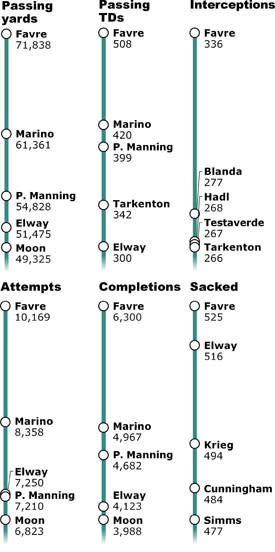Favre's place in history, by the numbers
More: Uncertainty following Favre Experiment
His recent dalliances with retirement drama and sexting controversies may have momentarily blinded us to Brett Favre's(notes) on-field football greatness from a historical perspective. As he appears to be finally winding down his career, it's worth separating the off-field stuff and focusing on Favre's place in NFL history.
Favre's records
How the top five players compare in many of Favre's career leading categories.

Source: Pro-football-reference.com
No matter what happened in this last misbegotten season, Favre will retire as the all-time NFL leader in pass attempts and completions, passing yards, passing touchdowns, interceptions and sacks. It's a test of endurance we've never seen before from a quarterback, and though Peyton Manning(notes) may threaten some of those records in the next five years, Favre is the only one to spend that much time on the top of the mountain.
As noted baseball statistician Bill James has done with the concepts of "peak value" and "career value" over the years, it's worth wondering how many times Favre has been the NFL's unquestioned top quarterback on a per-season basis. James originated the idea of similarity scores to find the closest comparisons between baseball players across different eras. The system has since been adapted for football.
With those numbers, we can look at where Favre stands in the grand scheme of things. We know that Favre was the ultimate stat collector – but how good was he really from season to season?
At his very best in Green Bay, which was probably the 1996 season (325-for-543, 3,899 passing yards, 39 TDs, 13 INTs), Mike Holmgren's West Coast offense left Favre a bit short in raw stats, but very high in efficiency. That was the only season Favre won a Super Bowl and the only time he finished first overall in Football Outsiders' cumulative efficiency metrics. What stands out in Favre's numbers during this period is the consistency – the two closest comparisons to his 1996 season among any NFL quarterback are his 1997 (304-for-513; 3,867 passing yards; 35 TDs; 16 INTs) and 1998 (347-for-551, 4,212, 31 TDs, 23 INTs) seasons. After that, the similarities run to a mixed bag of fluke seasons by average quarterbacks (2004 Aaron Brooks, 1990 Jim Everett, 2002 Kerry Collins(notes)) and less-than-best campaigns by the cream of the crop (2004-2006 Tom Brady(notes), 1989 Dan Marino, 1988 Jim Kelly).
How did he do in the declining years of a quarterback, which is generally pegged around the mid-to-late 30s?
We can bring in his last season with the Packers, the 2007 season (356-535, 4,155, 28 TDs and 15 INTs) in which he was as efficient as any quarterback in the league. Other similar seasons were Favre in 2009 and Peyton Manning in 2008 and 2009. In 2007, Favre reaped the benefits of an improving offensive line and a lot of talented young players, as opposed to his one season with the Jets, where injury, personnel, and coaching issues led to disappointing results. In that season in New York (343-522, 3,472, 22 TDs, 22 INTs), his closet competitors were himself five times, and Warren Moon of 1995. Even though Favre underperformed to previous standards as a Jet, the fact that he was still playing at an above league average level with his fortieth birthday just around the corner defied all available comparison to anybody but himself.
This may be the most impressive aspect of his on-field legacy: Favre is the best old quarterback in NFL history, and it isn't even close. The 2009 season he put up at age 40 (363-531, 4,202, 33 TDs and 7 INTs) was unprecedented; the closest similarity from an age perspective (over 35) is the Favre at age 39 and 38. Two other over-35 quarterbacks come closest from the production side – the 37-year-old Rich Gannon in 2002 (418-618, 4,689, 26 TDs and 10 INTs), and the 38-year-old Kurt Warner(notes) in 2009 (339-513, 3,753, 26 TDs and 14 INTs). And to put that season from a 40-year-old in line with any other quarterback season, the closest overall similarities to Favre's 2009 come from Peyton Manning in 2008 and 2009, and Trent Green(notes) in 2005.
The unique consistency of Favre's better years comes in the overall one-, two-, and three-year sim scores for his entire career. His closest peer was himself. Favre's numbers weren't always the most eye-popping, but his historical per-season value was legitimate, especially when he went forward at ages when most great quarterbacks are furthering broadcasting careers.
Favre's career will be remembered a lot like his life – heroic and exciting, but flawed and sometimes inexplicable boneheaded. But make no mistake, even though his final season was a disaster for a host of reasons, Favre isn't just a guy who hung around too long. He was great in the NFL longer than anyone else has been, and elite far longer than anyone ever has a right to expect. It may take awhile for all the ancillary drama to fade and reveal the magnitude of that accomplishment, but in the end, it's both the length and breadth of his career that make Brett Favre such an intriguing individual.
Love him or hate him, we'll never see his like again.
